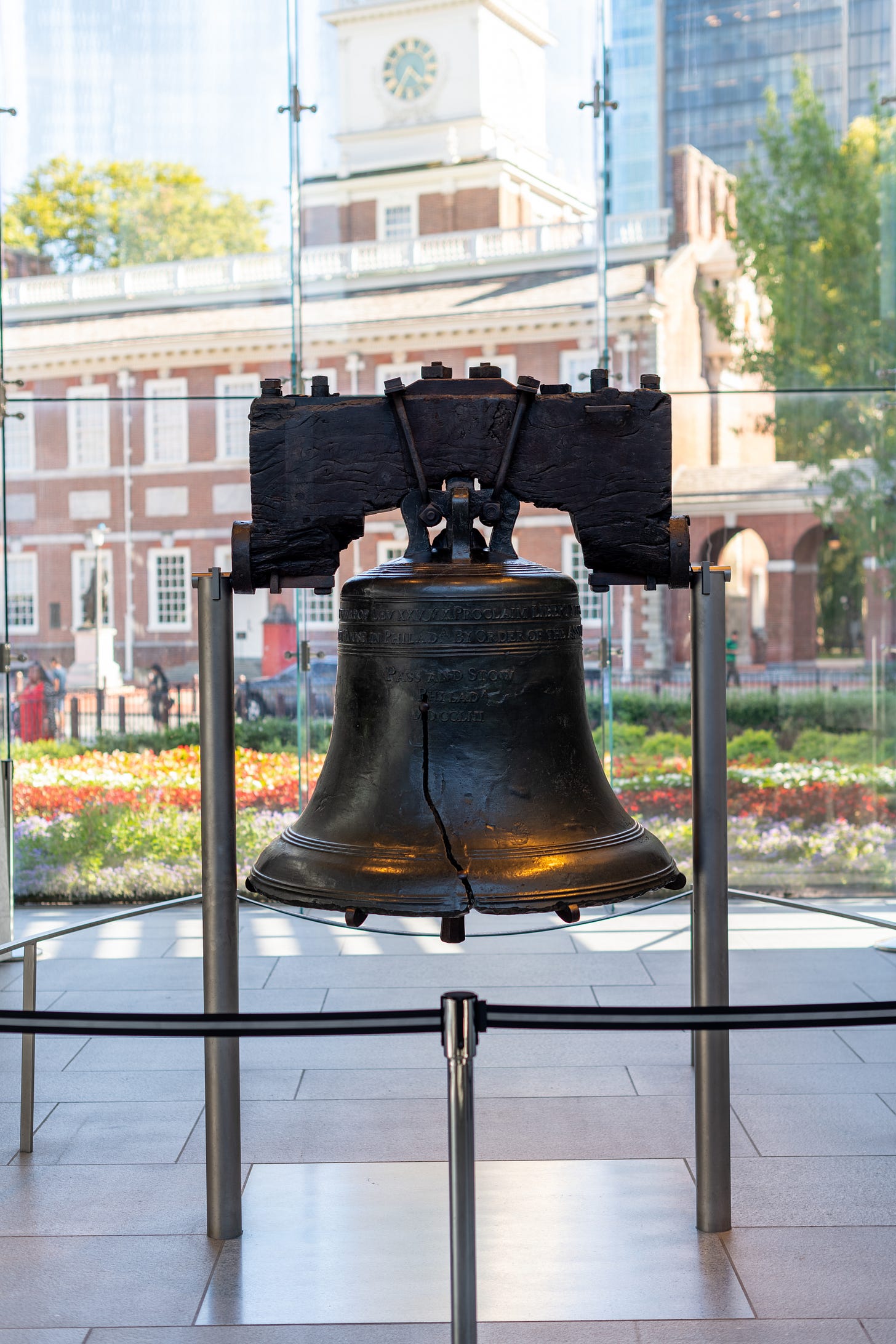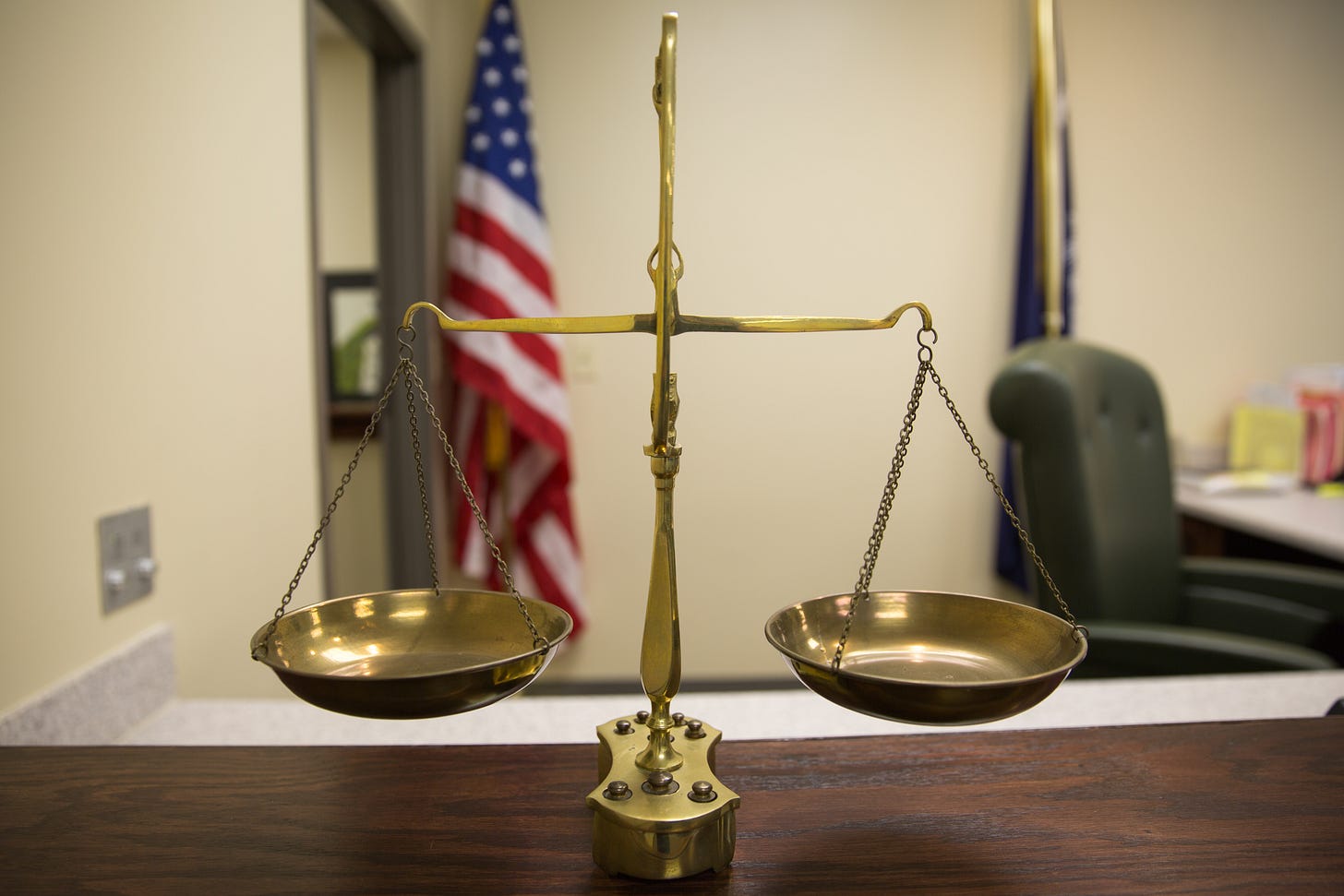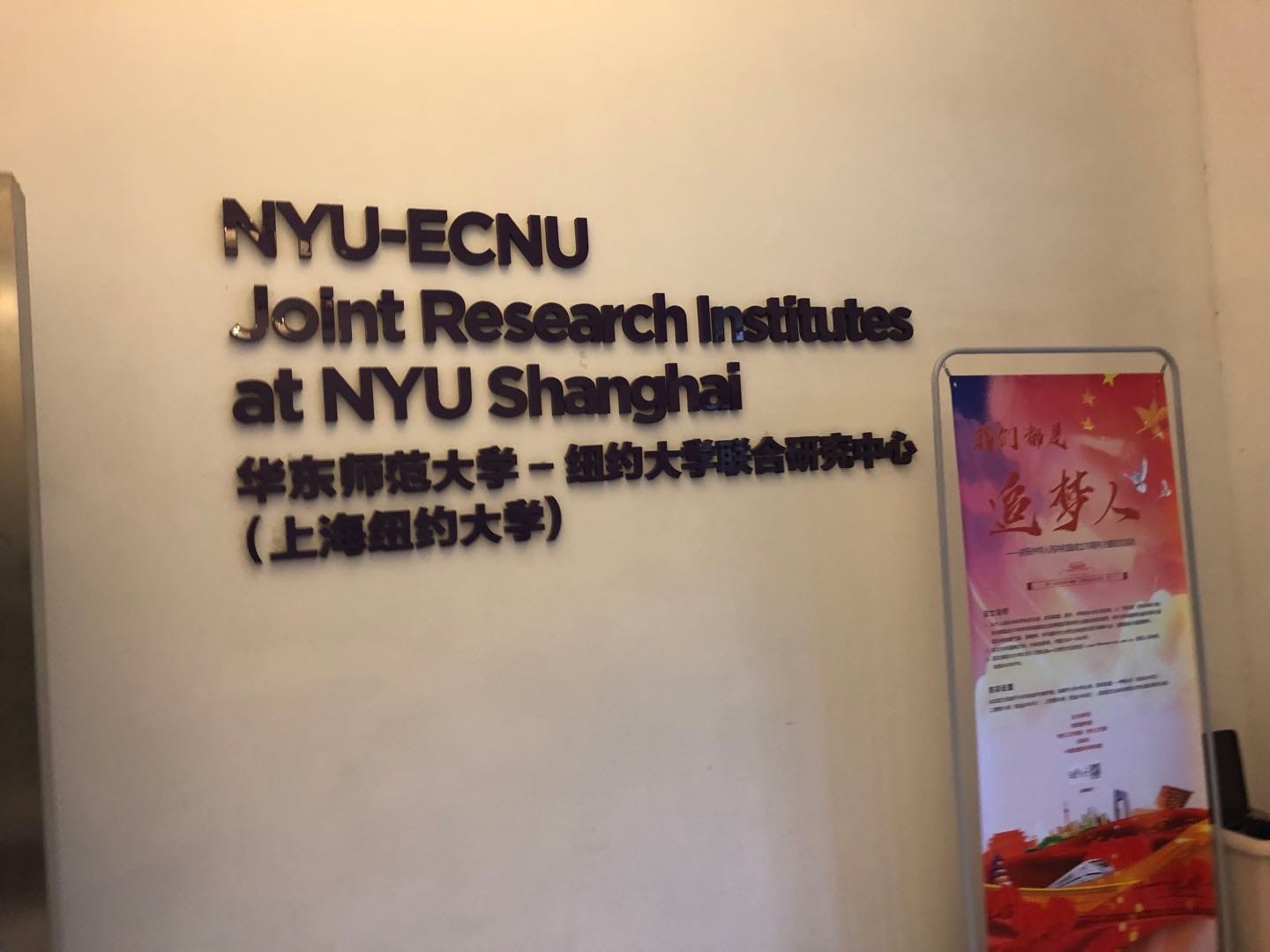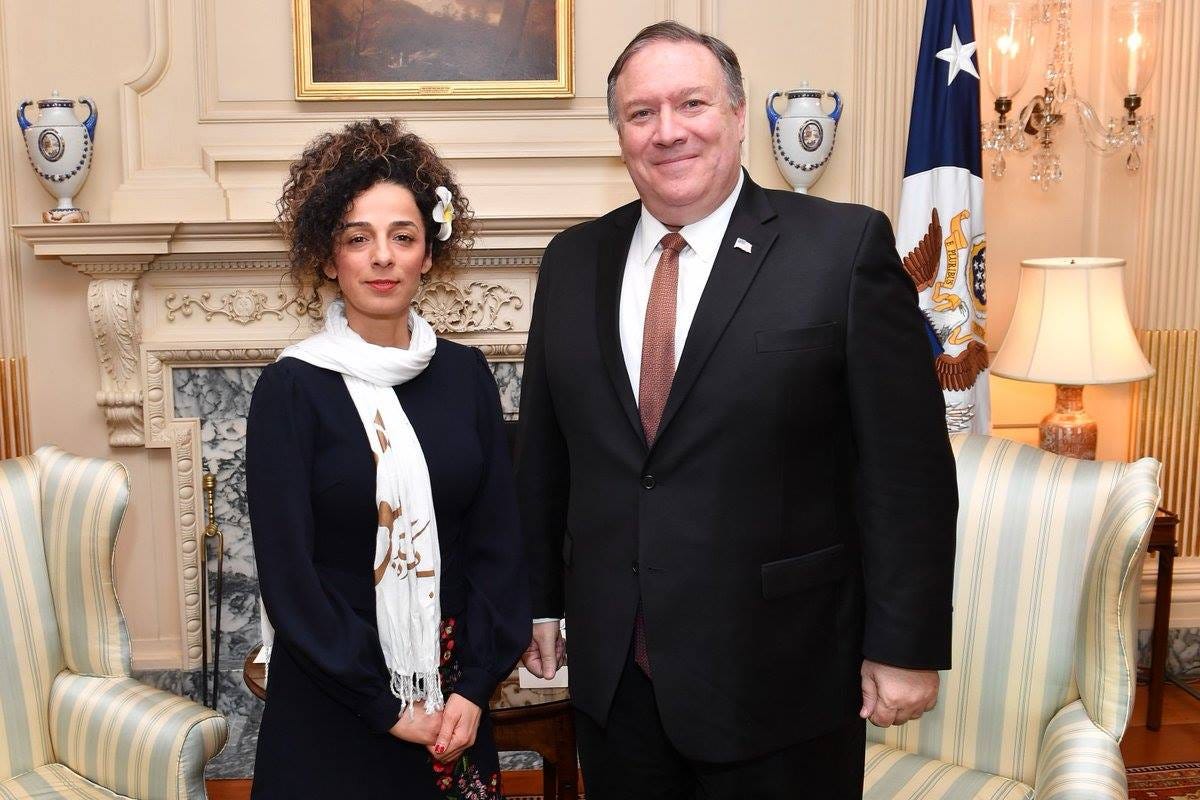Why Free Speech? (Part 1)
Reflections on the justification for free speech after the FIRE conference in Philadelphia

Free speech was my first love in politics. My earliest participation in organized activism was with the American Civil Liberties Union (ACLU) in high school. For the Gen Z readers out there, this was during Obama’s first term and before the ACLU was radically transformed from a civil liberties organization into a front group for the Democratic Party. But that is a story that has already been told.
Back to some more autobiography. As an adolescent civil libertarian, I didn’t reflect that much on why I believed free speech was a core value. It seemed obvious. As I was coming of age in an America mired in the War on Terror and the Great Recession, it felt like free speech was at least one quintessentially American value I could get behind. It might not solve the problem of war and peace or economic inequality, but at least it was something positive about a country which otherwise seemed to be headed in the wrong direction.
When I turned to organized left politics in college, other concerns displaced free speech from its central role in my politics. The harsh realities of economic exploitation and imperialism began to take precedence in my worldview. While I never overtly condemned free speech as a petite bourgeois ideological construct, civil liberties and free expression were undoubtedly demoted in my list of political priorities.
It was only after witnessing the rapid rise of cancel culture on the identitarian left and experiencing the culture of censorship on the communist left first hand that I began to gain a renewed appreciation for freedom of speech. Indeed, I suspect that most anyone who has participated in politics since the Trump years has come to realize that free speech is not just a luxury addition to the “real” politics of material and ideological struggle. Instead, it appears that free speech is itself a precondition for doing politics in any meaningful sense.
This realization—in many ways a return to my teenage intuitions—has led me to reconsider the question of free speech. In the wake of the ACLU’s Trump-era ideological capture, several organizations have attempted to fill the vacuum. The New Civil Liberties Alliance, for instance, was formed in 2017 “to protect constitutional freedoms from violations by the Administrative State.” The Foundation for Individual Rights and Expression (FIRE), formerly known as the Foundation for Individual Rights in Education, expanded its efforts beyond American college and university campuses in 2022.
I have known about FIRE’s efforts to protect free speech and due process on campus for quite some time. In fact, I was lucky enough to win first place in the organization’s essay contest on free speech in academia back in 2011. FIRE’s broadened mission in 2022 prompted me to join the expanded national organization and I have been closely following its activities over the course of the last year.
When I had the opportunity to participate in the FIRE Student Network Summer Conference last month in Philadelphia, I figured I should take it. Little did I know, the conference would spark a political-intellectual reckoning of sorts centered around the question: Why free speech? This question inspired a number of related questions that have preoccupied me since the conference: What is the best justification for free speech? Is it possible to justify free speech outside the framework of liberalism? How can the free speech movement be revived to resonate with a broad section of the population?
As these questions suggest, I could not simply undo my personal political history. I could no longer be the naive civil libertarian I once was who simply saw free speech as obvious, as a given, as something only a fool would oppose. As I returned to free speech advocacy anew, I went into the FIRE conference with a deeply sympathetic yet critical eye.
Glimpses of the FIRE Conference
FIRE’s conference was extremely well-organized, not only logistically, but also in its messaging. It’s rare to come away from a conference with the sense of a clear “thesis” around which all the programming was arranged, but FIRE’s leadership successfully organized the three-day event around a central claim. The conference thesis was clearly stated in FIRE President Greg Lukionoff’s opening remarks and reiterated consistently throughout the weekend.
The thesis goes something like this: We can never know if we are entirely correct in our views. Therefore, free speech is an essential guardrail against totalitarian elements within society which insist upon the ultimate truth of their views and the moral certainty of imposing those views on others. Put slightly differently, free speech, in contrast with these ideologically totalizing worldviews, cherishes above all else the principle of “epistemic humility”—the idea that there is always a chance we may be wrong. Only societies guided by this principle can be deemed “free.”
This thesis manifested itself in different ways throughout the conference. In one session devoted to due process on campus, FIRE policy reform staffer Ryan Ansloan presented the justification for due process in similar terms to the justification for free speech. It is better to let a guilty man go free than to convict an innocent one. Why? When it is difficult to know with an overwhelming degree of certainty if someone is guilty or innocent, epistemic humility naturally flows toward the presumption of innocence.

Most American colleges and universities fail miserably at guaranteeing due process on campus. FIRE’s detailed “Guide to Due Process and Campus Justice” is an excellent resource for understanding the nitty gritty of campus disciplinary procedures. In late 2022, FIRE also released an extensive report, which scrutinized due process at 53 top American universities and discovered that:
Nearly two-thirds (60.4%) of America’s top 53 universities do not explicitly guarantee students that they will be presumed innocent until proven guilty.
More than seven out of every ten schools (71.7%) do not provide timely and adequate notice of the allegations to students accused of wrongdoing before expecting them to answer questions about the incident.
Fewer than one out of every six schools rated (15%) guarantee students a meaningful hearing, where each party may see and hear the evidence being presented to fact-finders by the opposing party, before a finding of responsibility.
In another session, entitled “Campus Free Speech at Home and Abroad,” FIRE “global expression” scholar, Sarah McLaughlin, took American universities to task for promising free speech at their satellite campuses in China and the Middle East. She argued that the globalization of American higher education has complicated national laws, making it difficult to confine struggles for free speech and expression inside the boundaries of traditional nation-states. When American students are at risk of censorship at satellite campuses abroad, such as New York University’s Shanghai or Abu Dhabi campuses, free speech at American colleges and universities becomes a global issue.

The panel also highlighted concerns surrounding the influence of the Chinese Communist Party (CCP) on American college and university campuses. McLaughlin gave several examples including the arrest of a Chinese Berklee College of Music student for politically-motivated stalking, the censorship of anti-CCP artwork by George Washington University administration, and the response of Cornell University to a conflict between Chinese students over a speaker addressing the Uyghur controversy in Xinjiang. She also singled out tech companies like Zoom and Midjourney AI for contributing to a culture of censorship in ways that can curtail global expression.
Classical Liberalism and the World Order
I could say more about the details of the conference proceedings, but I’d like to come back to the bigger question that the conference prompted me to consider: Why free speech?
While I was in complete agreement with the conference leadership about the threats to free speech on American college and university campuses, the justification provided for free speech left me uneasy at times. In particular, the conference thesis I summarized earlier was deeply rooted in the principles of classical liberalism, the branch of Enlightenment thought that advocates political and economic freedom within the framework of individual rights as the ultimate philosophical principle to guide society’s development.
The ideological project of classical liberalism was most evident during the aforementioned session on “Campus Free Speech at Home and Abroad.” This session brought to the fore a central problem for classical liberals, namely, the tension between the abstract universal values of free speech and expression and the concrete reality that these values are not prioritized in the majority of the world.
This tension begs the question: Should classical liberals be content with protecting free speech in their own local, regional, or national milieus or should they work to expand their advocacy on a global scale? It would seem, on the one hand, that classical liberals would be reluctant to impose their values on others precisely because of a fundamental belief in “epistemic humility,” or the idea that those values could be wrong. On the other hand, classical liberalism seems to require free speech as a sort of meta-value that exists independent of all other political values as a very precondition for their existence.
As a result, free speech advocates are presented with the practical problem of whether to comment or intervene in the affairs of other countries, societies, and cultures far removed from the historical Anglo-American bastions of classical liberalism. One student at the FIRE conference—born outside of America somewhere in the “Global South”—explicitly posed this question to FIRE “global expression” speaker, Sarah McLaughlin. He asked something along the lines of whether FIRE’s efforts to internationalize its activities might smack of a certain arrogance in light of the fact that many people in other parts of the world simply do not hold the same values as American advocates of free speech and expression.
McLaughlin provided a measured answer to the question which essentially reiterated her earlier point that American colleges and universities should be honest about the constraints on their ability to guarantee free speech and expression rights at satellite campuses outside of the United States. Nonetheless, the rhetoric of this session in particular and the conference as a whole reinforced the “democracy vs. autocracy” talking point promoted in Biden administration foreign policy rhetoric. Even though FIRE often finds itself at loggerheads with the Biden administration domestically, its rhetoric on the salient features of the global order seem to be entirely in alignment. “Free societies” are implicitly Western and, while free speech may be embattled in these societies in recent decades, they are still light years ahead of their “unfree” counterparts outside of America and Western Europe.
Perhaps this characterization is a bit unfair. Global free speech and expression advocates, including many at the FIRE conference, invoke dissidents in countries like China, Iran, and Cuba to demonstrate the universal value of free speech. But what is usually left out of the picture is the role of American economic and foreign policy in producing the very movements and governments that clamp down on the proverbial “marketplace of ideas.”

As Angela Nagle of
notes in a debate with one prominent advocate of classical liberalism, we can “discuss abstract principles in peace all day long at home because liberalism has been waging wars for global dominance abroad.” In other words, the ostensibly democratic dialogue in “free societies” is enabled precisely by imperial incursions which render other societies unfree. Indeed, it is undeniable that American war-making abroad is one of the key drivers of resistance to classical liberal ideals—and the attraction of other ideologies—in the majority of the world. Unless classical liberals address this issue both ideologically and politically, their worldview will continue to fall flat among large swaths of the population.What exactly is the attraction of ideologies like communism, Islamism, ethnonationalism, integralism, and the host of other perspectives on politics that reject the assumptions of classical liberalism? For one, all of these ideologies—in contrast with a bare-bones classical liberalism—recognize to varying degrees Nagle’s perceptive observation that:
Market liberalization and cultural liberalization are part of the same project. Many classical liberals believe that they can simply stop the project in the cultural realm at a point at which they once felt comfortable. But progress doesn’t stop, that’s how it works. And liberalism is nothing if not the ideology of progress.
The classical liberals at FIRE make a compelling case for free speech as a precondition for politics. But, at the same time, they ignore the precondition for resistance to the very classical liberalism that undergirds their argument for free speech: American imperialism and the havoc it has wreaked on global economy and culture.
An Alternative Justification for Free Speech?
Despite my frustration with the classical liberal ethos that permeated the FIRE conference, I left feeling very sympathetic to the organization’s advocacy for free speech. Does that mean that I have to accept the classical liberal argument for free speech articulated in the conference’s thesis? Or are there alternative arguments for free speech that do not rely on classical liberal assumptions?
These questions took me in the direction of legal and philosophical writings on free speech. The most famous justification for free speech in American legal philosophy came from Supreme Court Justice, Oliver Wendell Holmes Jr., who called for the “free trade in ideas” in a 1919 opinion. Holmes asserted that “the best test of truth is the power of the thought to get itself accepted in the competition of the market,” a statement which was later codified in the “marketplace of ideas” expression, first used by the Supreme Court in 1967.
Legal precedent for free speech in America is based on this classical liberal idea of the “marketplace of ideas.” It is no coincidence that this argument for free speech relies on a metaphor with laissez-faire economics, in which “the market” is imbued with a moral value above and beyond that of any individual human intuition or intention. Because we can never know if we are right, we can never trust our moral intuitions, which must be subordinated to the decisive power of market forces. In other words, the “marketplace of ideas” serves as a solution to the problem of epistemic uncertainty.
In the American literature on free speech, this idea was passionately expressed by Judge Learned Hand in his 1944 speech, “The Spirit of Liberty,” which was referenced multiple times during the FIRE conference. In particular, Hand’s elegant declaration that “the spirit of liberty is the spirit which is not too sure that it is right” perfectly captures the fallibilist doctrine embedded in the classical liberal justification for free speech. Because of our own shortcomings in apprehending the truth as individual human beings, some other force—namely, the market—must intervene to arbitrate social conflict and lead society progressively closer to the truth.
This is an attractive argument, especially for those of us who have imbibed it from an early age in the United States. However, in today’s America, it would take a high level of denial to believe that the “marketplace of ideas” is successful in efficiently producing truth. One student pressed FIRE Chief Council member, Robert Corn-Revere, on this very question during the last day of the conference. Corn-Revere responded that, in the “marketplace of ideas,” better ideas tend to rise to the top and move us toward a better world but this is not always the outcome. His defense of the “marketplace of ideas” was not that it would inherently tend toward truthful ideas but, rather, that it was better than any other known method at creating the conditions of possibility for the truth to emerge.
This is a much less ambitious classical liberal case for free speech than Justice Holmes’ confident assertion in the wisdom and reliability of the marketplace of ideas over one hundred years ago. Indeed, even classical liberals can see that the “marketplace of ideas” doesn’t guarantee “progress” in the twenty-first century. I agree with Corn-Revere that no one method will automatically cause the truth to prevail. However, the conviction that the “marketplace of ideas” would produce truths was a key facet of the classical liberal defense of free speech. It strikes me as a severe blow to classical liberalism that its own adherents now seem to accept that such a claim has been falsified by contemporary political realities.
In light of this weakened classical liberal argument for free speech, I return to my central preoccupation in this essay: Is there an alternative justification for free speech that avoids the now widely recognized delusions of classical liberalism? Philosopher Akeel Bilgrami has taken up this question in a number of places, most notably in his 2009 essay, “Truth, Balance, and Freedom.” Bilgrami argues against the classical liberal argument for free speech, with a focus on its early articulation in John Stuart Mill’s 1859 essay, On Liberty. It was Mill’s argument that was later recapitulated by Holmes and Hand to form the basis of the legal justification for freedom of speech in the United States.

Bilgrami observes that the classical liberal argument for free speech “does not aim to convince us to adopt a value (the value of free speech) on the basis of any other moral or political values.” Instead, its logical foundation in epistemic fallibilism is an appeal to pure human rationality which—by implication—any rational person should accept. Bilgrami rejects the classical liberal argument because it demands that we accept the moral and political value of free speech on the basis of a value-free premise.
Despite his critique of the classical liberal argument for free speech (which is worth reading in full), Bilgrami does not reject free speech as a value. Rather, he contends that free speech can and should be justified, but not in the universal, rationalist way that the fallibilist “marketplace of ideas” argument would imply. With reference to academic freedom, Bilgrami writes that:
We should allow alternative frameworks not because we have some generalized doubt that we ourselves might be holding false views...[I]f we allow for frameworks of investigation other than our own, we make for an attractively diverse intellectual ethos and in doing so allow the creativity of different sorts of people and minds to flower.
I am still mulling this argument over myself, and am admittedly not completely convinced. But I do find it far more compelling than the cliché idea of the “marketplace of ideas.” Unlike the classical liberal case for free speech, Bilgrami’s argument states that we must hold other values than the value of freedom of speech before we can accept freedom of speech as a value. This gets to the heart of my unease with the classical liberal “value-free” argument for free speech, which seems fundamentally disingenuous. Bilgrami admits that his alternative value-laden argument “appeals only to those who think that there is value in creativity and diversity,” a fact which renders it less universal than the purely rationalist classical liberal argument but, I believe, more forthright in its premises.
Broadening the Free Speech Movement
I offer this political and philosophical critique of the classical liberal argument for free speech not to undermine FIRE’s incredibly important advocacy. Because American legal justifications for free speech have historically relied on the classical liberal argument, we desperately need organizations like FIRE that can defend free speech on these grounds. I will continue to support FIRE’s work, which I recognize as indispensable at a time when free speech is under attack from forces across the political spectrum.
At the same time, I believe that we also need a better argument for free speech than the classical liberal one offered at the FIRE conference. The classical liberal defense of free speech rings increasingly hollow in a world where the proverbial “marketplace of ideas” appears anything but efficient at producing the truth. We need a free speech movement that is broad enough to include alternative justifications for free speech, such as the one provided by Akeel Bilgrami. While these justifications may not strike the powerful chord of rationalist universalism from which the classical liberal argument derives its strong emotional appeal in Anglo-American politics, making space for alternative arguments is absolutely necessary if we wish to build a broad movement for free speech.
Let me be clear: I am not calling for the purely instrumental invocation of free speech made by the communist and identitarian left alike. Regarding the communist left in twentieth-century America,
states:There was an awful lot of cancellation of people. They were declared “enemies of the Soviet Union,” and there was all sorts of cancelling going on. So we shouldn’t deny that the left culture intersects with the civil libertarian culture, but they do not overlap.
I have, at times, in my past involvement with the communist left, participated in this kind of cancel culture. It is a hypocrisy that I can no longer accept. The contemporary cultural left, mired in exclusive self-righteous identitarianism, is, of course, no alternative to the history of cancel culture in the communist movement. Finkelstein insightfully observes that this contemporary variety of cancel culture:
pre-empts a serious pursuit of truth. Too many taboos, too many fences. The pursuit of truth becomes subordinate to the defense of what “feels good.” It became a “feel good” priority over whether something is true or not.
I would add to Finkelstein’s well-chosen words that the pursuit of truth, after all, is not a right but a duty. Allow me to conclude with some brief remarks on this theme.
Classical liberalism is plagued not only by a dubious justification for free speech, but also by a broader privileging of rights over duties. But the very history of the free speech movement in the United States belies classical liberal control of the free speech narrative. In Mario Savio’s famous 1964 speech during the Berkeley Free Speech Movement, he explicitly invokes duties rather than rights:
There is a time when the operation of the machine becomes so odious, makes you so sick at heart, that you can't take part; you can't even passively take part, and you've got to put your bodies upon the gears and upon the wheels, upon the levers, upon all the apparatus, and you've got to make it stop. And you've got to indicate to the people who run it, to the people who own it, that unless you're free, the machine will be prevented from working at all!
Perhaps it will be an appeal to duty, rather than the liberal rhetoric of rights, that will reinvigorate the free speech movement in America today. In a world where we cannot put our trust in the “marketplace of ideas” to sort out truth from falsity, Savio’s speech reminds us of the deeper meaning of free speech: the duty to pursue the truth and to act on the results of that pursuit in the face of repression.





Isn't duty basically a no-no word for the left? I wonder if there is a way to undo the polarization around free speech. A left that is not for free speech is fundamentally incoherent, since if there is something the left stands for, it's liberation, so I have no idea how they square the derision they currently have for free speech with the rest of their ideology. Jesus, it genuinely seems so hard. Maybe it's even impossible, the only way forward being if most people turn post-political. Then, perhaps free speech could be restored.
And it would be good for other reasons, since politics is just a bad thing to be passionate about anyway.